I do not have particularly strong opinions one way or the other about the video game sub-genre known as "walking simulators" in general. I have strong opinions about some of the games that I've played within this genre, but I would not say that I either like or that I dislike "walking simulators" as a whole genre. Some work well and are good games. Others are un-engaging or lazy and didn't particularly work for me.
For example, I hated Dear Esther and Ether One. I was immensely disappointed in Amnesia: A Machine For Pigs, after having enjoyed The Dark Descent. But on the other side of the coin, I thoroughly adore Gone Home, Firewatch, and What Remains of Edith Finch.
Patrons had early access to the full video essay.
Are "Walking Sim" games?
So what is a "walking simulator"? Well, like with most things in pop culture, the definition will vary depending on who you ask. But I think most people would agree that a "walking simulator" can be accurately described as interactive entertainment that conveys a narrative almost exclusively through the exploration of an environment and the clues provided therein. You may notice that I used the term "interactive entertainment" as oppose to "video game". I did this in order to keep this discussion's definition as non-contentious as possible. One of the criticisms of walking simulators that I specifically wish to address is the idea that they are not video games, and such critics would immediately object to the use of the term "video game" in the definition. These experiences generally lack any of the violent conflict that is present in most video games, and the mechanics rarely go beyond navigating obstacles, solving puzzles, or managing a limited inventory.
While I am perfectly content to call walking simulators "video games", there are somewhat valid arguments for why the label might not be appropriate for such entertainment products. It could be argued that they are not video games because they lack conflict; they lack a traditional win state, fail state, or any stakes at all; and they lack mechanical depth or complex systems. I personally do not accept these arguments as disqualifying walking simulators from consideration as "video games". There are plenty of universally-accepted video games that also lack one, or even all three of those criteria.
Many games have lacked violence conflict, traditional win states, or complicated system mastery. [More]
33ddcfeb-42d4-4173-a671-208c4b4b2d96|0|.0
Tags:YouTube, walking simulator, horror, politics, Dear Esther, Silent Hill: Shattered Memories, Amnesia: the Dark Descent, Amnesia: a Machine for Pigs, Layers of Fear, _Observer, Blair Witch, Soma, Gone Home, What Remains of Edith Finch, Firewatch, Outer Wilds, Death Stranding, P.T., Silent Hills, PS5, haptic feedback
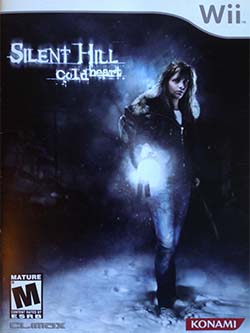
Shattered Memories was derived from
a pitch called "Cold Heart",
which was not supposed to be a "re-imagining".
This may be old news to some people, but earlier this month, I came across a post on Silent Hill Memories dot net that included scans of the full, 14-page pitch document for the game that became Silent Hill: Shattered Memories. Climax held a contest to give away seven copies of the document to fans, and scans of the document have since been posted online in various sources.
The document tells us that the final product ended up being radically different than the original concept. Apparently, Climax did not originally intend to do a remake / reboot / "re-imagining" of the original Silent Hill. Instead the plot would continue on with the standard Silent Hill timeline (presumabely following the events of Homecoming) with a new character. The game's working title was Silent Hill: Cold Heart. The document outlines what some of the game's intended features were supposed to be (including combat mechanics that were completely cut from the final product), describes the main character, and also provides a brief walkthrough of an early chapter of the game.
The introduction page describes the playable character: Jessica Chambers. Jessica was planned to be an over-stressed and emotionally-vulnerable college student. She ends up in Silent Hill after a freak snow storm causes her car to crash on her way to visit her parents.
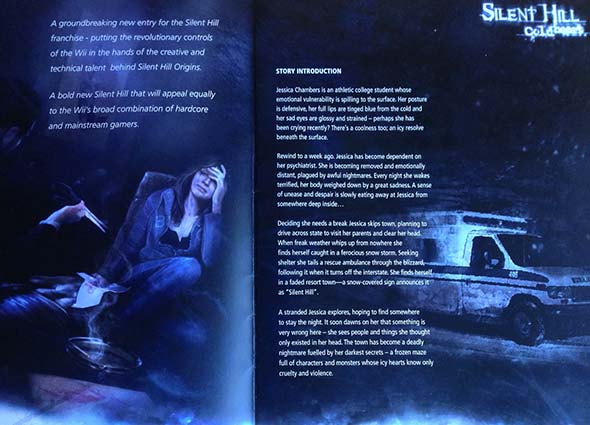
Page 1 and 2 describe the main character, Jessica Chambers, and how she ends up in Silent Hill.
Jessica is described as being "emotionally vulnerable" and is dependent on a therapist. She has nightmares and is "weighed down by a deep sadness". The pitch doesn't specify the nature of this sadness or her reason for being dependent on a therapist (other than perhaps the stress of college).
I would suspect that the reason for her sadness and the therapy would have been similar to Shattered Memories: that one or both of her parents are probably dead, she has repressed the memory, and experiences nightmares of Silent Hill as a subconscious attempt to confront these repressed memories. You know, repressed memories of dead people is what Silent Hill is all about, right? ... [More]
3ffed8ed-e518-4294-811c-8ecf5f0019c3|7|3.4
Tags:Silent Hill Shattered Memories, Silent Hill Cold Heart, Konami, Nintendo, Wii, pitch, sequel, reboot, therapy, horror, puzzle, combat, map, Jessica Chambers, Cheryl Mason, Heather Mason, women, Silent Hill, Climax Studios

I was going through the comments on my posts a while back, and I came across a doozy of a comment by user Maiden T. I'm not going to replicate the entire post here, but you can review the comment at the link provided. In summary, the commenter asserts that Silent Hill, as a series, was never about occultism, and that all the games were "repressed-memory morality tales". The first Silent Hill and "to an extent the third one" are the exceptions (according to Maiden T).
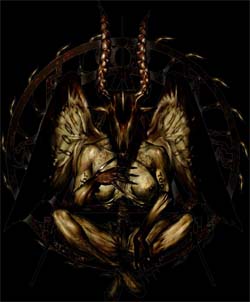
Totally unrelated image of a demon god...
My mind just about exploded when I read this comment, and I started typing up a response, only to realize that I had written a whole blog's worth of counter argument. So, I decided to just turn it into a new blog. I'll continue my series of analysis and interpretation articles about Silent Hill with a write-up about how the series is most definitely about occultism.
What is Silent Hill about?
I've already tackled two topics that I consider to be common myths about Silent Hill. The first was about the over-sexualization of Pyramid Head, and the second was about the realness of the Otherworld. Now I'll address one of the most fundamental misunderstandings about the series: what is it about?
The repressed-inner-demon myth
Probably the most core and fundamental myth about the Silent Hill series is the continued propagation of the idea that the series (as a whole) is about characters dealing with repressed inner demons - typically a repressed memory of guilt over a perceived sin which they have committed. This idea is rooted in the popularity of Silent Hill 2. It is so pervasive, that the designers and producers of newer installments of the series embrace it, while dismissing the other critical elements of the other games' stories:
"[My favorite SH game is] Silent Hill 2. I didn’t really care for all the heavy occult based storyline in SH1 and 3. I felt SH2 had the best stand alone storyline, and provided the best atmosphere of all the SH games by far.
[...]
I find all the in’s and out’s of ‘The Order’ to be overly intricate and rather uninteresting, but that’s just my opinion."
- Devin Shatsky (producer, Shattered Memories, Downpour), in an interview with Hell's Descent (Nov 5, 2010).
The reason that Silent Hill 2's design was so successful (and unique within the series) is because SH2's excellent atmosphere was based around feelings of melancholy and depression rather than fear and threat.
Exploring a character's personal guilt and depression works great when the entire game is designed around that central, unifying theme! It doesn't work quite so well when ... [More]
04f88e94-11ac-43f4-beb3-1cd282060bf0|19|4.1
Tags:Silent Hill, Silent Hill 2, Silent Hill 3, Silent Hill 4: the Room, Silent Hill Origins, Silent Hill Homecoming, Silent Hill Downpour, Silent Hill Shattered Memories, Team Silent, Konami, cult, occult, fan fiction, horror, Harry Mason, Alessa, Dahlia Gillespie, Cheryl Mason, Heather Mason, James Sunderland, Red Pyramid Thing, Pyramid Head, Claudia Wolf, Vincent Smith, Henry Townshend, Walter Sullivan, Travis Grady, Alex Shepherd, Shepherd's Glen, Murphy Pendleton, ritual, Flauros, demon, god, Mary Shepherd-Sunderland
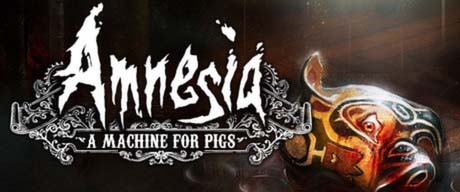
Is Frictional Games working on a new IP? I'm a bit curious as to why they outsourced development of the aptly-named A Machine for Pigs to the third-party developer The Chinese Room. Frictional's staff did stay on as "producers" for this game, so I'm sure that the final product is still consistent with what Frictional would have wanted if they had developed it themselves, and I think the overall story was still written by people at Frictional (but I could be wrong on that account). In any case, the change in development team has certainly had a dramatic effect on the way that the new game plays. The very core gameplay of exploring a linear dungeon with a flashlight is retained, but all the mechanics and the underlying feel of the game are completely different than its predecessor. This isn't necessarily a bad thing, as Amnesia: the Dark Descent wasn't perfect.
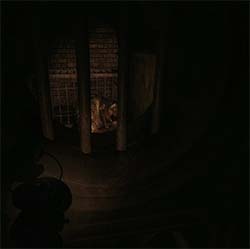
Once again, the underlying premise that sets up Amnesia: a Machine for Pigs is that your character wakes up in a mansion with no memory of who he is or why he is there. Your early exploration of the mansion reveals some vague threat, and you are forced to descend into a deep dungeon in order to discover who you are and resolve the threat. Along the way, you'll encounter deformed creatures and collect notes and documents from your former self explaining the situation, as well as have the occasional hallucinatory flashback as your memory slowly returns. But if you're worried that this sounds too much like the previous game, then fear not: A Machine for Pigs takes an entirely different approach to the gameplay and has a totally different feel to the entire experience. [More]
d070d945-e6da-4541-a97f-8240050b5cc7|1|4.0
Tags:Amnesia: a Machine for Pigs, Amnesia: the Dark Descent, review, the Chinese Room, Frictional Games, Steam, Victorian, England, industrial, survival, horror, survival horror, mansion, amnesia, Battle of the Somme, Silent Hill, Silent Hill Shattered Memories, Resident Evil, checkpoint, indie gaming
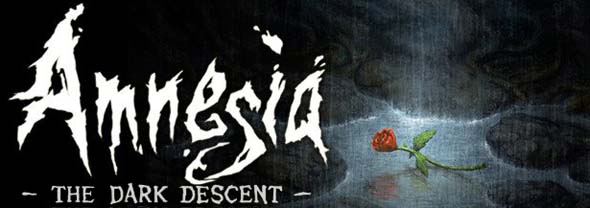
Since Silent Hill Downpour failed miserably to scratch my survival horror itch, I’ve been looking for something else to fill that niche. I picked up Amnesia: the Dark Descent on a Steam sale for pocket change, and am very glad that I did.
Mainstream game companies don’t seem particularly interested in releasing good survival horror games. It’s a very niche market and difficult to find mass-market appeal. Modern horror games mostly ape off of Resident Evil 4 by being designed as an action shooter first, and survival horror game second (if at all). The genre is dominated by fast-paced "boo"-scare games like Dead Space and F.E.A.R., and gone are the days of the deliberately-slow-paced psychological games like Silent Hill 2 and Fatal Frame. The "survival" element has mostly fallen away since resource management is widely regarded as too tedious, and the "horror" is usually just represented with difficult combat.
But where mega-publishers and AAA developers have dropped the ball, the Indie market filled in the gap 3 years ago (Sept 2010) with Amnesia: the Dark Descent.
Amnesia goes to the opposite extreme as Resident Evil 4 and Dead Space. This game is not an action game. [More]
dcd7f8cf-6f87-43f5-bf47-23ebe40b5ba4|3|4.7
Tags:Amnesia: the Dark Descent, Frictional Games, Steam, PC, H.P. Lovecraft, review, steampunk, survival, horror, survival horror, macabre, amnesia, sanity, Silent Hill Downpour, Silent Hill Shattered Memories, Dead Space, Resident Evil 4, Eternal Darkness, checkpoint, indie gaming
|

| 12 | | | | | | | 60 | | 11 | | | | | | | 55 | | 10 | | | | | | | 50 | | 09 | | | | | | | 45 | | 08 | | | | | | | 40 | | 07 | | | | | | | 35 | | 06 | | | | | | | 30 | | 05 | | | | | | | 25 | | 04 | | | | | | | 20 | | 03 | | | | | | | 15 | | 02 | | | | | | | 10 | | 01 | | | | | | | 05 |
|